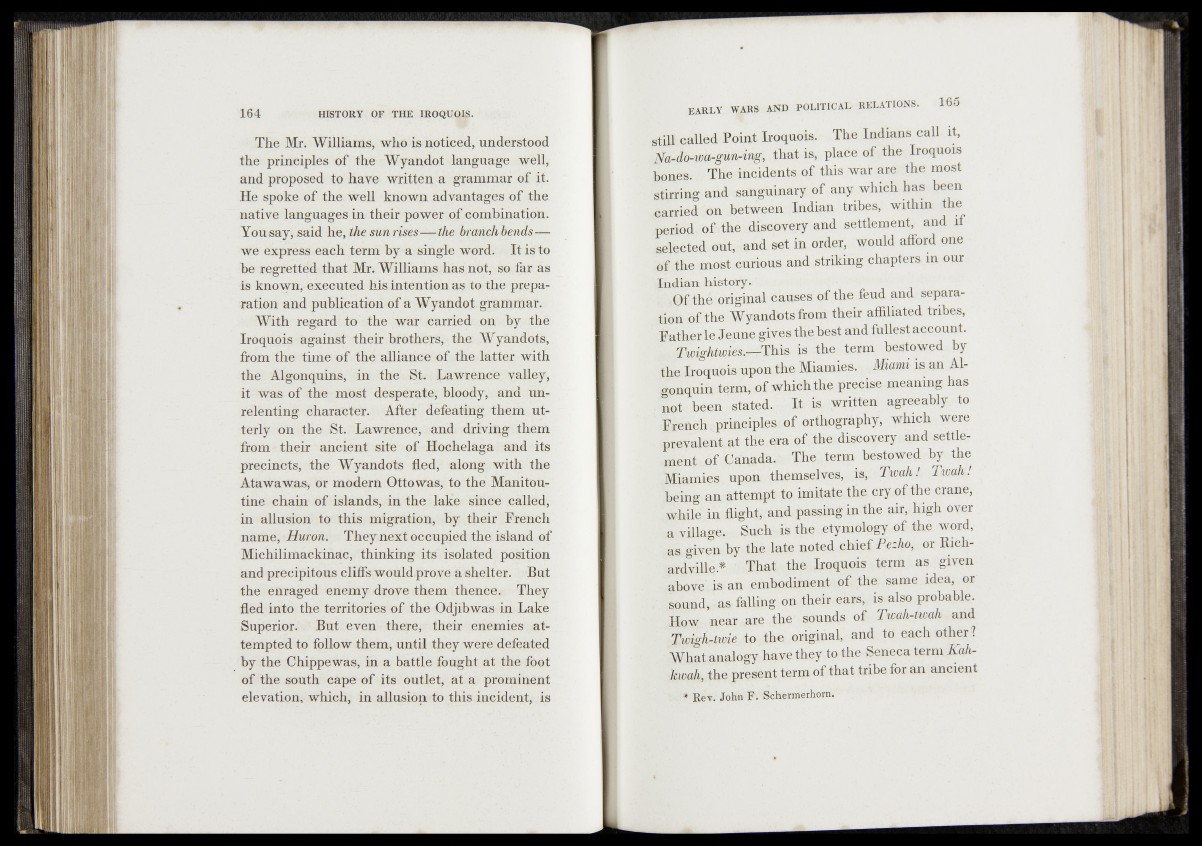
The Mr. Williams, who is noticed, understood
the principles of the Wyandot language welly
and proposed to have written a grammar of it.
He spoke of the well known advantages of the
native languages in their power of combination.
You say, said he, the sun rises— the branch bends —
we express each term by a single word. It is to
be regretted that Mr. Williams has not, so far as
is known, executed his intention as to the preparation
and publication of a Wyandot grammar.
With regard to the war carried op. by the
Iroquois against their brothers, the: Wyandots,
from the time of the alliance of the latter with
the Algonquins, in the St.. Lawrence valley,
it was of the most desperate, bloody,. and unrelenting
character. After defeating them utterly
on the St. Lawrence, and driving. them
from their ancient site of Hochelaga and its
precincts, the Wyandots fled, along with the
Atawawasy or modern Otto was, to the Manitou-
tine chain of islands* in the lake since called,
in allusion to this migration, by their French
name, Huron. They next occupied the island nf
Michilimackinac, thinking its isolated position
and precipitous cliffs would prove p. shelter. But
the enraged enemy drove them thence. They
fled into the territories of the Odjibwas in Lake
Superior. But even there, their enemies attempted
to follow them, until they were defeated
by the Chippewas, in a battle fought at the foot
of the south cape of its outlet, at a prominent
elevation, which, in allusion to this incident, is
still called Point Iroquois. The Indians call it,
tfa-do-wa-gun-ing, that is, place of the Iroquois
bones. The incidents of this war are the most
stirring and sanguinary of ; any which has been
carried on between Indian tribes, within the
period of the discovery and settlement, and if
selected out, and set in order, would afford one
of the most curious and striking chapters in our
Indian history./ .
<©f thé original causes of the feud and separafather
le Jeune gives the best and fullestaccount,
, Twightwies.-rThis is the term bestowed by
the Iroquois upon the Miamies. j , Miami is an Algonquin
term, of which the precise meaning has
not been stated. It is written agreeably to
t e n c h principles of orthography, which were
prevalent at the.era of the discovery -and settlement
of Canada.' The term bestowed by the
jVtiamies upon themselves, is, Twah! Twah!
being an attempt to imitate thé cry of the crane,
while.in flight, andrpassing in the air, high over
a village, ^^uchris the etymology of the word,
as , given by the late noted .chief Pezho, or Rich-
ardvüle.*, That the Iroquois term as given
above' is an embodimenfeof the. same idea, or
sound, os falling on their oars, is also probable.
Howr near ore the sounds of Twah-twah and
original, and to each other?
What analogy have they to the Seneca term Kahtr*
be *°ran ancient
ï * ■ Rev. JofefiP. ScherHierhorn; 3